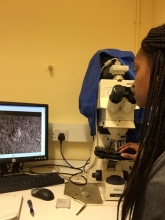
University:
Major:
Site Abroad:
Mentor(s):
Faculty Sponsor(s):
Faculty Sponsor's Department:
Project Title:
Project Description:
Fatigue damage is the result of fluctuating stresses that are loaded onto a material, thus permanently changing its structural components. Fatigue is extremely important when considering materials such as 304 stainless steel, which are used in production for many major technologies. By using ultrasonic testing, vibrating at 20k Hz on meso-cantilevers that were machined by a laser technique, the fatigue life of 304 stainless steel can be evaluated within the 105 to 108 high cycle regime, and down to the length scale ~ 100 um. The resonant frequency and the maximum bending stress of meso-cantilevers with varying dimensions was calculated using elastic finite element (FE) analysis simulations, allowing the effect of errors in machining or measurements to be quantified. The FE model was then calibrated by measuring the deflection of meso-cantilevers in experiments. Seventy meso-samples of 304 stainless steel were heat treated to obtain a grain size 20-50 mm and at an annealed condition. These testing pieces were examined at two stress amplitudes to present the failure distribution. Through in-situ optical observation, crack initiation and propagation was studied when samples were tested at various vibration amplitudes. EBSD was performed to map the crystal orientation of a meso-cantilever, enabling linking the fatigue behavior to the crystallographic features. Fatigue testing and observation will continue in the future to fully understand the relationship between fatigue life and microstructure for 304 stainless steel.
